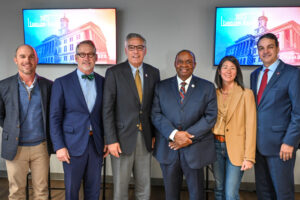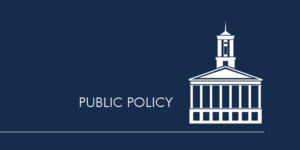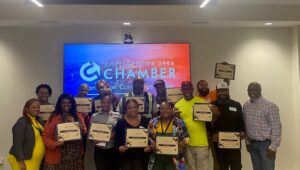Chamber Staff
The Chattanooga Chamber of Commerce and presenting sponsor BlueCross BlueShield of Tennessee host DIVERSIFY 2021 Friday, June 18. This half-day virtual summit highlights diversity, inclusion and the 21st century workplace with informative breakout sessions and a keynote presentation from Rick C. Wade of the U.S. Chamber of the Commerce.
DIVERSIFY 2021, held via Zoom, features a 10 a.m. keynote presentation by Rick C. Wade, senior vice president of Strategic Alliances and Outreach at the U.S. Chamber of Commerce. An 11 a.m. panel discussion will follow, with local experts’ reactions to the keynote.
These speakers include:
- Moderator Dionne Jenkins, Tennessee Valley Federal Credit Union, with panelists:
- Justin Groenert, Chattanooga Chamber of Commerce
- O’Mally Foster, Vision Hospitality
Full registration is $15 and includes live attendance and Q&A opportunities with presenters plus access to recordings after the event.
Register and find full session information here.
Get to Know Rick C. Wade

Rick C. Wade is senior vice president of Strategic Alliances and Outreach at the U.S. Chamber of Commerce. Wade develops and implements programs and initiatives to help the Chamber create new business relationships and partnerships across diverse audiences. He also provides counsel on policy issues and leads special projects. His wealth of knowledge and experience in both the public and private sectors enable him to give a megaphone to the voice of business across the country and share the positive impacts of the free enterprise system. Among Wade’s many responsibilities, he is leading the Chamber’s historic Equality of Opportunity initiative aimed to develop sustainable public policy and business solutions to help close race-based opportunity gaps in education, employment, entrepreneurship, criminal justice, health and wealth.
You've led an exciting career – what achievement has felt like the biggest accomplishment for you?
My biggest accomplishment was serving as Senior Adviser to the 2008 Obama for America Presidential campaign and helping to orchestrate the election of our country’s first African-American president.
What can business professionals at any level of responsibility do to advocate for inclusion within their companies and communities?
Advancing diversity, equity and inclusion inside companies and across communities is not just a moral imperative, but a matter of our economic competitiveness. In its Business Case for Racial Equity, the W.K. Kellogg Foundation asserts that our economy stands to gain $8 trillion by 2050 by closing the racial equity gap. Moreover, businesses that recognize and embrace inclusion perform better across multiple financial metrics. Companies in the top quartile for ethnic and racial diversity on executive teams are 33% more likely to have industry-leading profitability.
Business professionals should lead by example to create inclusive environments and healthier workplace cultures. They can organize staff forums for honest conversations; ensure pay equity; provide unconscious bias training; designate a Chief Diversity Officer; establish employee resource or affinity groups; create a diversity advisory council; or establish a mentoring program to support diverse managers.
Based on your work supporting businesses, what would you identify as 1.) the main silver linings and 2.) the most negative impacts, of the pandemic on business overall?
The main silver lining is the resiliency, determination and perseverance of business. In the face of a global pandemic and an economic crisis, small businesses have done their best to keep their doors open and their employees on payroll. It has been business innovation that led to the development of the vaccines and therapeutics needed to save lives and get our economy open.
The most negative impact of the pandemic has been on small businesses in America. Minority-owned enterprises have been disproportionally hit hard. U.S. Chamber of Commerce research showed that 66% of minority-owned businesses were concerned about permanently closing as a result of the pandemic. A study from the National Bureau of Economic Research reports that 41% of Black-owned businesses have already closed from February to April 2020.
Through a partnership with the U.S. Chamber, our small business members can now opt in to receive benefits of U.S. Chamber Small Business Membership at no additional cost. Do you have any specific recommendations for how they can get the most out of this?
Being a member of the U.S. Chamber provides small businesses a seat at the policy table and a voice on issues that affect them. Some of the resources that small businesses should take advantage of include valuable market data and research; tools to access government lending; guides to help navigate the pandemic; information on international trade; premier events and webinars; relationships that can lead to business opportunities and more.
About our other speakers:
Dionne Jenkins

Dionne Jenkins is Vice President of Diversity and Inclusion for the Tennessee Valley Federal Credit Union. In addition to her work to increase diversity and community engagement there, she serves on many boards and commissions. Jenkins is a graduate of the Urban League of Greater Chattanooga Inclusion by Design Executive Leadership Development Program and Leadership Chattanooga. Her work has been written about, honored and shared in several regional and national publications.
Justin Groenert

Justin Groenert is the Vice President of Public Policy for the Chattanooga Area Chamber of Commerce. In this role, he oversees all policy development and implementation and all aspects of government affairs for the business community of Chattanooga. A native of Evansville, IN, Justin has a Bachelor of Arts Degree in Political Science and a certificate in Political Communications from Western Kentucky University (2004) and a Masters of Public Administration degree from the University of Southern Indiana (2016).
O'Mally Foster

As the vice president of talent resources and risk management at Vision Hospitality, O’Mally Foster performs an important role in identifying new talent as Vision continues to grow. He also supports company leaders as they assist their associates in maximizing their full potential. Foster’s career began in 1996 as the regional training specialist and LP agent for Cracker Barrel Old Country Store, Inc. From this position, he transitioned into the hospitality industry where he gained experience as an assistant general manager and a rooms manager. He later became the regional director of human resources for Noble-Interstate Management where he supported a portfolio of hotels that employed over 3,000 associates.






